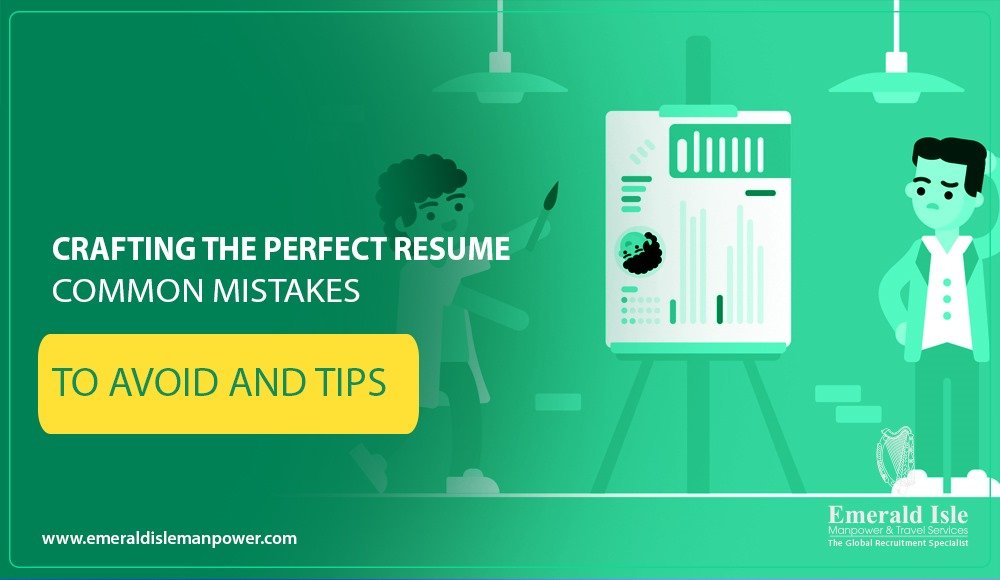For job seekers, it is essential to create a resume that catches the attention of potential employers to get their dream job. But a lot of applicants make typical errors that can make it harder for them to get an interview. Here is a list of common mistakes made by job seekers and advice on how to ensure a strong resume. Your resume is often the first impression you make on a potential employer, so it needs to be perfect. While a poorly written resume can block the doors to interviews and career possibilities, a well-written one can help open them. Recognizing common resume mistakes and learning how to avoid them will help you create a resume that successfully highlights your experiences and abilities, attracting the attention of potential employers.
Common Mistakes Job Seekers Make in their Resume
Typos and Grammatical Error:
Grammar and spelling mistakes can seriously damage your professionalism. These mistakes are frequently seen by recruiters as a sign of negligence and inattention to detail. It’s essential that you check your resume several times and think about utilizing Grammar. Having a friend or mentor examine your resume might also help you find mistakes you might have missed.
Irrelevant Information:
Your resume may appear cluttered and detract from your relevant qualifications if it contains irrelevant work experience, hobbies, or personal information that isn’t relevant to the position. It’s crucial to modify your resume such that it emphasizes your relevant experiences and abilities for the position you’re going for, proving your suitability for it.
Lack of Specifics:
When you describe your accomplishments in general terms rather than using numbers, it can make your contributions seem unimportant. Saying “Responsible for sales” is not as powerful as saying “Increased sales by 30% over six months.” Your abilities and successes are better understood when they are expressed in concrete, quantifiable accomplishments.
Too Long or Too Short:
A resume that is too long may be overwhelming to recruiters, and one that is too short may not contain enough information. If you have less than ten years of experience, try to keep it to one page; if you have more, aim for two pages. Usually, this length is adequate to describe your credentials without tiring the reader out.
Poor Formatting:
A resume that uses different fonts, sizes, and layouts may be challenging to understand. Make sure your format is tidy and businesslike, using indentation, bullet points, and consistent spacing. A CV that is well-structured has a higher chance of keeping the reader’s interest and properly communicating your information.
Objective Statements:
It is out of date to provide a generic objective statement. Use a customized personal profile or summary that highlights your most important skills and what you can offer to the position in place of a general statement about your professional ambitions. This strategy has greater impact and relevance.
Not Tailoring the Resume:
It’s a typical mistake to send the same resume to multiple positions without tailoring it to the job description and qualifications. Customizing your resume for every application demonstrates that you have taken the time to learn about the position and how your experiences and talents meet the needs of the business.
Excessive Use of Vocabulary:
Employers, particularly those without a strong technical background, may find it challenging to comprehend your qualifications if your resume is overflowing with acronyms and industry-specific jargon. Make your resume readable to a wider audience by describing your accomplishments and talents in simple, straightforward language.
Missing Contact Information:
Employers may find it difficult to contact you if you do not provide them with your most recent contact information, including your phone number and email address. To make it simple for recruiters to reach you, make sure your contact information is up to date and clearly placed at the top of your resume.
Omitting Volunteer Experience:
Employers may have concerns if gaps in employment are not addressed. Provide a brief explanation of any gaps in your work experience in your cover letter or CV. Giving context reduces worries, regardless of whether you took the time off for personal, academic, or other legitimate reasons.
Tips for Ensuring a Polished Resume
Keep your resume updated:
Maintaining a current resume guarantees that it highlights your most recent achievements, experiences, and skill set. This is particularly crucial if you’ve recently changed professions, learned new skills, or finished large projects. Having an updated resume frees you from the constant need to add fresh information and puts you in a position to apply for new chances. Make a note to review and update on a regular basis, even if you’re not looking for work.
Keep your simple and elegant:
Readability requires an organized, expert format. Select a typeface that is straightforward and easy to read, and keep the formatting the same throughout the document. Steer clear of employing eye-catching visuals, vibrant colors, or unusual fonts that could detract from the message. Having a well-structured resume with distinct sections makes it easier for recruiters to locate the information they need. White space is your buddy since it gives the CV a less cluttered, more readable appearance.
Including relevant facts:
Make sure the information you include is specifically related to the position you’re applying for. Emphasize your successes, experiences, and abilities that fit the job description. When feasible, quantify your accomplishments with specific instances. This helps prospective employers consider you as a suitable fit for the position by demonstrating to them exactly how you can benefit their company.
Add keywords to your resume:
Incorporate keywords from the job description. This practice is essential for ensuring your resume passes through applicant tracking systems, which many employers use to filter applications. Software, industry terminology, and specialized skills are examples of keywords. You may improve the chance that a recruiter will see your resume and pick it up by making sure it uses the same language as the job posting. But make sure the keywords are suitably and organically incorporated into the body of your resume.
Sell your value:
Highlighting your accomplishments and the ways in which you benefited your prior employers can help you to effectively convey your value. Anytime you can, measure your achievement using metrics. For instance, provide an explanation of the results of your work rather than just listing your responsibilities. This strategy highlights your efficacy and provides prospective employers with concrete advantages that you can offer their company.
Proofread multiple times:
Make sure to proofread several times carefully to identify any mistakes. Make sure it reads naturally and makes sense by going through it yourself after utilizing tools like Grammarly for an initial inspection. Ask a friend, mentor, or coworker to look over your resume as well. Different eyes can frequently see errors that you might have missed and can offer insightful criticism on presentation clarity and general quality. Making a good first impression and keeping your resume professional require making sure it is error-free.
In conclusion, today’s competitive employment market, it is imperative to craft a resume that successfully highlights your qualifications while avoiding common mistakes. You can greatly increase your chances of getting an interview by paying attention to detail, customizing your resume for each job application, and conveying your experiences briefly and simply.
Recall that your resume serves as a potential employer’s initial point of contact, therefore it must be flawless. Frequent updates, a clean and elegant format, relevant information, strategic keywords, a focus on your worth, and careful editing ensure a polished and professional resume.Incorporate keywords from the job description into your resume. This practice is essential for ensuring your resume passes through applicant tracking systems, which many employers use to filter applications. You may make a resume that stands out and leads to new work prospects by putting these recommendations into practice.








